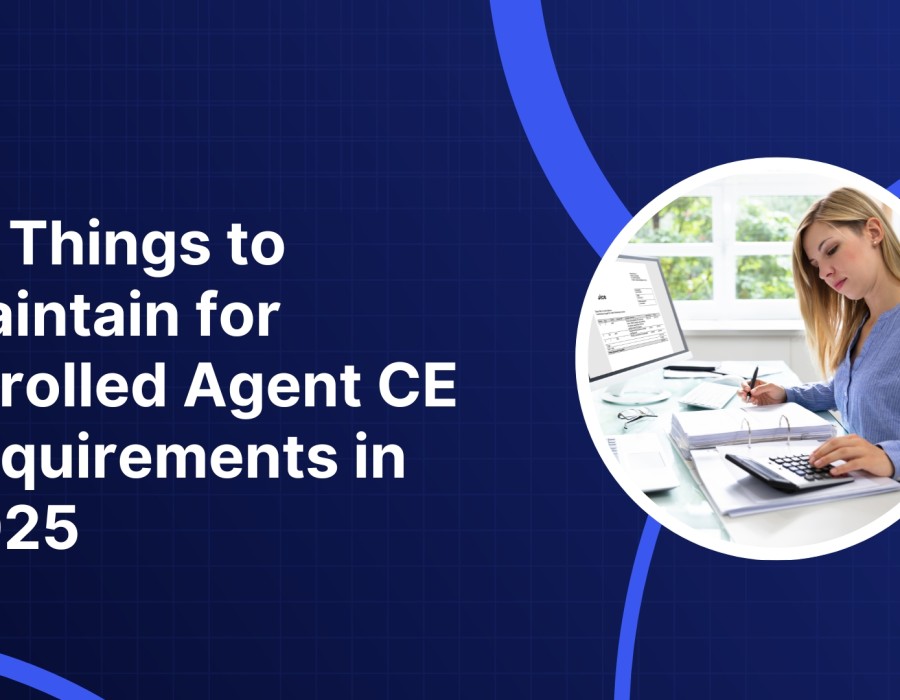Becoming an Enrolled Agent (EA) is a significant achievement, but maintaining the credential is just as important. The IRS expects enrolled agents to stay current with ever-changing tax laws—and that’s where Enrolled Agent CE requirements come into play. Whether you're new to the EA world or a seasoned tax pro, understanding and staying on top of these Continuing Education (CE) requirements is crucial.
Here are the 10 key things you must maintain to stay compliant, grow your expertise, and make your renewal process smooth.
1. Clock in 72 CE Hours Every Three Years
Let’s start with the golden number: 72 hours. That’s how much CE enrolled agents need every three-year renewal cycle, as required by the IRS. These 72 hours must include:
- 16 hours per year, with at least 2 hours in ethics annually
- This ensures you're not just checking boxes but staying informed throughout the cycle
Staying proactive is key—don’t try to complete all 72 hours in year three. Spread it out, and keep your learning consistent.
2. Include 2 Ethics Hours Every Year—No Exceptions
The IRS mandates a minimum of 2 hours in ethics CE every calendar year. Ethics content usually covers professional conduct, responsibility toward clients, and understanding circular 230 guidelines.
Neglecting ethics hours is one of the most common ways EAs fall out of compliance. Thankfully, many CE providers bundle ethics into their course packages to make it easier.
3. Use IRS-Approved CE Providers Only
Not all CE providers are created equal. If the IRS doesn’t recognize the provider, your credits don’t count—simple as that.
Always choose IRS-approved providers like MYCPE ONE that are listed on the IRS CE provider registry. This ensures your hours are automatically reported to the IRS, eliminating headaches during renewal.
4. Track Your PTIN and Reporting Details
Your Preparer Tax Identification Number (PTIN) links you to your CE records. Each time you complete a course, the provider reports it under your PTIN.
Make sure you:
- Renew your PTIN annually
- Use the same PTIN across all CE submissions
- Keep track of reported hours through your IRS PTIN account
A mismatch or lapsed PTIN can cause complications in verifying your CE.
5. Stay Updated on Annual EA CE Requirement Changes
The IRS occasionally tweaks EA CE rules. Staying in the loop helps you adapt without scrambling at the last minute.
For instance, in recent years, more emphasis has been placed on cybersecurity awareness and client data protection—topics you might see included in EA CE course offerings.
6. Keep Documentation—Even If It’s Reported
Even though your provider reports CE hours directly to the IRS, you still need to keep certificates and proof of completion for at least four years.
Why? In case of audit or discrepancies. A best practice is to organize:
- A digital folder by year
- Course completion certificates
- Emails confirming CE hours
Being organized reduces stress when renewal season hits.
7. Plan Around Busy Season
We get it—tax season is intense. CE often gets pushed aside during the January–April crunch. To avoid the end-of-year rush:
- Block a few hours every month for learning
- Use mobile-compatible platforms so you can learn on-the-go
- Consider live webinars or on-demand formats
8. Diversify Your Topics
Yes, tax law is your bread and butter—but don’t forget related areas that enhance your services:
- Client advisory services
- Data security
- Special tax topics like cannabis accounting or gig economy taxation
Diversified courses not only fulfill EA CE requirements but also boost your value to clients.
Looking to branch out even further? Explore specialized programs like CMA CPE courses, which complement EA skills with finance and management knowledge.
9. Watch for Scams and Low-Quality Content
Not all CE content is created equally. Watch out for:
- Unapproved providers
- Poor-quality content that’s outdated or irrelevant
- Misleading course hours (some promise more than they deliver)
Stick with trusted platforms. For example, MYCPE ONE is vetted, IRS-compliant, and features real tax experts with years of field experience.
10. Renew Timely and Avoid Lapses
The IRS EA credential renewal period is every three years, ending on January 31st of the year after your cycle ends.
If you forget or fall short of hours:
- Your license may expire or go inactive
- You may need to retake the Special Enrollment Exam (SEE)
Don’t let that happen. Use a CE dashboard or calendar alerts to stay on top of renewal deadlines.
Final Thoughts
Meeting your Enrolled Agent CE Requirements isn't just about staying compliant—it's about staying sharp, relevant, and client-ready in a constantly evolving tax landscape.
From ethics and IRS updates to diversifying your expertise with programs like CMA CPE courses, your continuing education journey is key to long-term success.






Comments